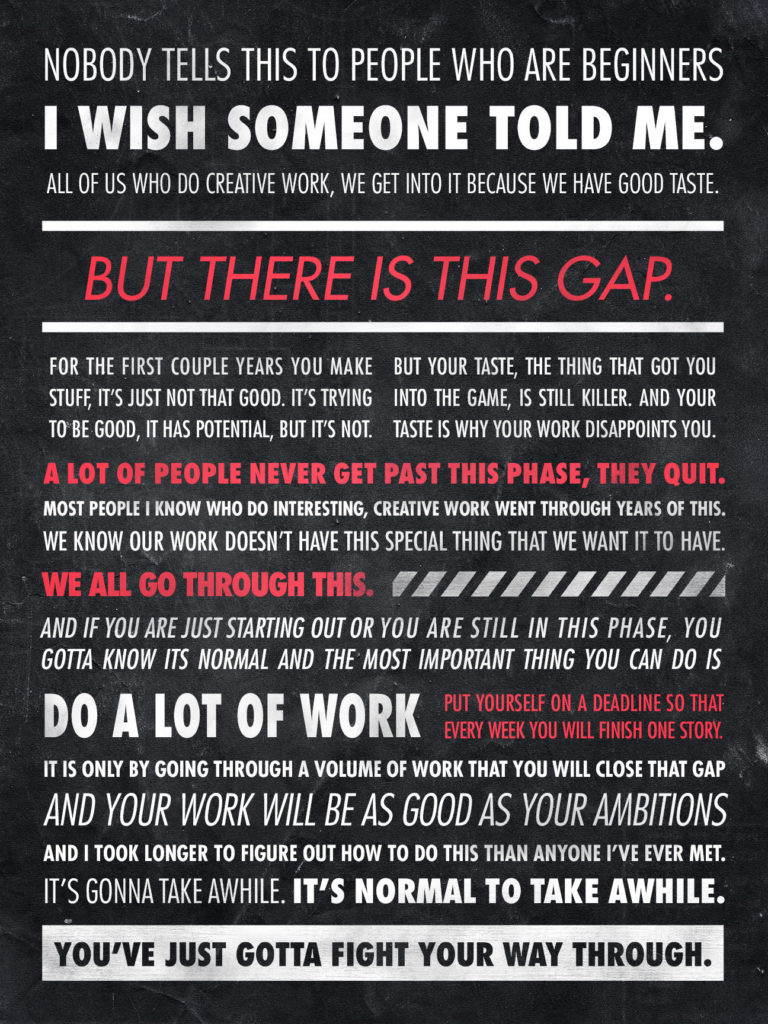 Once Upon a Time, I was going to Be a Writer. Sorry about the capitalization, but there was no avoiding it.
Once Upon a Time, I was going to Be a Writer. Sorry about the capitalization, but there was no avoiding it.
Of course, at first you don’t really want to be a writer as much as you want to be someone who has written. Better yet, someone who has published, really cool stuff, that you and a few million others really really like; love even.
You want to be so good you change people’s lives.
You want to give back to the Universe that feeling, those feelings, all that life you absorbed, acquired, imbibed, by reading. It’s only fitting, it’s only fair, that someone for whom books have been so important should write them.
So you write, for a few years, and you suck, and you can tell you suck. (See Above.)
Not to mention the fact that if you are as weak, as close to clinical depression, as undisciplined, as lazy, as I am, you talk about writing for years before doing it. (To be fair, I was waiting for word processing to be invented.)
When I finally started, I thought, if I wrote, and rewrote, and rewrote, my first story, long enough, it would be Publishable. Whatever that means. And so I wrote on it for a year, and finally sent it off to Analog, because, well I’d heard of Analog, and read a few issues. Or had I read Asimov’s? Anyway, I knew that Analog had once been Astounding, and Astounding had been great, and well, maybe I was great, too.
I printed the drafts out dot matrix on perforated fanfold paper every few days and marked up the copy with a red magic marker, an extrusion of wretched prose which grew longer and longer, but very slowly. Like a tumor.
Oh, that story. A novel’s worth of ideas, many of them stupid, in a novella length story-like thing. My first story combined elements of Eric Frank Russel’s Sinister Barrier with a Zelazny-like Men as God’s milieu, but set in the modern era; reality was a game played by a cabal of reincarnating immortals. The ending came to me in a dream–in a goddamn dream, a vision, and as I wrote it, I knew, I had tapped into something big, something incredible.
I’d be like Heinlein selling Lifeline to John W. Campbell. Oh, maybe I’d need to revise it. John Campbell sent back letters to aspiring writers longer than the stories themselves, i’d read, for Asimov and Heinlein and Clarke. OK, Campbell was dead, but whoever was editing Analog would probably write me a nice long note.
I remember that envelope, the weight of the manilla, the dot matrix address label, as I slid it into the pivoting maw of the blue Postal Box, and a sense of unease, or disquiet, as it fell away into blackness and suddenly, I couldn’t edit the damn thing anymore. The story was done.
I awaited my ascension.
I’ve lost that story, but I’m pretty sure it sucked donkey dick. An any rate, it was rejected with a half page form in six weeks, and I didn’t write another word for another year. Completely derailed by a completely ordinary foreseeable thing. I had no community. No support group. No friends who were writing. No class I was taking. I didn’t even read any books on how to write. I’d read 1000 novels, I should be able to write one. Jeeze.
Kids! Don’t be like me! They should bring me into writing workshops to give ‘scared straight’ rants to aspiring writers, like the convicts they use to frighten delinquents. It isn’t 1930 anymore, and I wasn’t Robert Heinlein, or JK Rowling or Neil Gaiman, and neither are you, and if you want to do this there are going to some goddamn bumps along the way. (See above.)
But during that year of mourning my Heinleinlessness, I met a friend, in a long-vanished basement used bookstore in Harvard Square, a great friend, a burly, hairy young man with thick glasses and a shy smile and a penetrating gaze. We talked for awhile, and it was like they say, you don’t make friends, you recognize them, and it turned out he wrote, too, and he had a group, and did I want to go? He gave me his phone number, because at that time, we didn’t have email addresses.
I was living with my girlfriend, friendless in a strange city, in shock at finally leaving my miserable home town, temping and trying to figure out who I was and what the hell I was going to do with my life. Yeah. I wanted to go.
This was twenty five years ago, I still want to go, and I’m going, again. I haven’t yet grown out of the Workshop Thing. I gave them up, for a time, and as it turns out, when I give up on workshops. I stop writing fiction. But I digress.
I took the red line to Charlestown, to a basement cafe, and found my bearded friend Ron, an ordinary looking guy named Steve, and a petite young woman named Carol–who was, as it turned out, a poet. Sort of.
My writing life began that day, everything beforehand was a prelude. I had now created a feedback loop that didn’t require John W. Campbell to write me letters on how to fix my stories, because, John W. Campbell was, and remains, very dead. I wasn’t dead. I was in my late twenties, the author of a single terrible novella, but I’d found the goddamned workshop, a few writers, somehow, this was going to work.
And it did. Sort of. Stay tuned.
